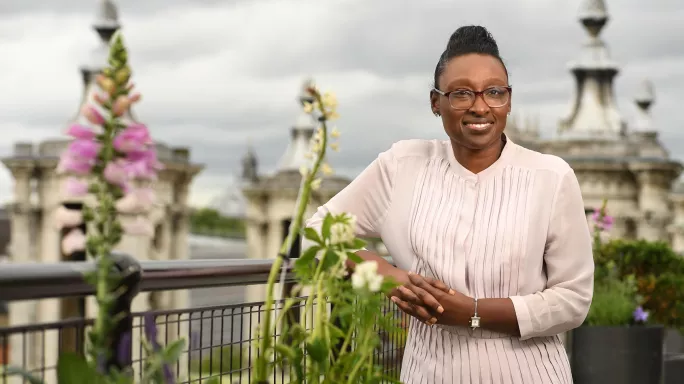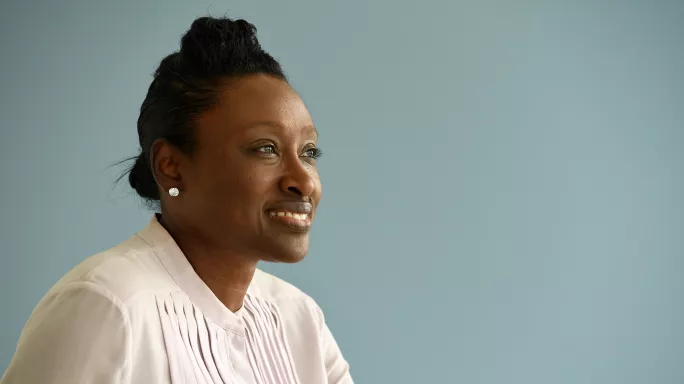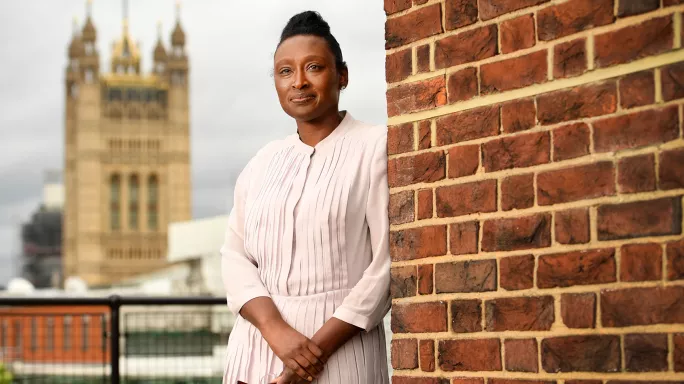- Home
- Meet the former primary teacher opening doors for SEND
Meet the former primary teacher opening doors for SEND

Anntoinette Bramble has a constantly refilling in-tray - as chair of the Local Government Association’s children and young people’s board, she has to present a strong message for councils on some of the most pressing issues in education.
In the last month alone, she has spoken out about special educational needs funding, early years speech support and the need for authorities to have powers to intervene in struggling schools.
Bramble went into politics to argue and organise for change - but it was her career as a teacher that showed her that improving lives is not about making a single, grand gesture but the day-to-day accumulation of small actions.
Profile: Meet the UK’s first female Muslim secondary headteacher
Tes awards: Meet the award-winning head who was told she would never make it
Campaigner: ‘SEND schooling needs to counter fear and offer hope’
“It’s ok to want to change and shape the world and have an influence,“ she says. “But you do it in those very small, everyday opportunities. It’s that conversation you have with that child, it’s that extra five minutes that you take with that parent when you don’t really feel you have five minutes. It’s those kind of things that make all the difference. That’s what I learnt [as a teacher].”

As well as her LGA role, Bramble is also deputy mayor and cabinet member for education at Hackney Council - a London borough which in 2010 ranked as the most deprived local authority district in England.
Hackney has seen the biggest fall in deprivation of any authority, as the area gentrifies, but it still has huge challenges with the 2015 statistics ranking it as 11th most deprived in the country.
Political debate began early
Bramble, 45, was born and has lived in the borough for almost her entire life - moving away only for university - and she credits her parents for an early interest in politics.
“My mother’s care, consideration and concern for others, I inherited that,” she says.
“And my father taught me to be a politician. He ingrained in me the need to understand what you believe in and be able to articulate that.
“I remember once we were talking about giving to charity, I said that you should give to charity and my father said no. It was really a quite strong debate, until my mother said that dad was winding me up. And I realised that, what he wanted to ensure was that it’s all very well to have an opinion, but you need to think about why you have that opinion.”
Her parents Lenroy, a retired civil servant, and Bernadette, a retired senior officer in a local authority, both arrived in London in their early teens - Lenroy from Montserrat and Bernadette from Grenada.

The eldest of their three children, Bramble began her education at Orchard primary school, before moving out of the borough to go to a Church of England school, St Marylebone’s CE secondary school in central London.
She remembers the “lovely ethos” of St Marylebone’s and the long bus journey - which she discovered later her father had followed her on the first few times to make sure she got to school safely.
She started at sixth form, but soon left to set up a company with a friend. They approached record companies, pitching to interview celebrities and then sold the interviews to magazines.
“My parents were brilliant because it wasn’t enough to live off, but it was enough for a while … It was two young people thinking ‘we like music, let’s try and interview some celebrities’… It was really, really good fun.”
But after a couple of years, in which she interviewed musicians, such as Mary J Blige and Shaggy, she wondered how sustainable it was to carry on interviewing musicians at 3am after a concert for a 6am deadline - and she was increasingly interested in doing something that she felt could shape the world.
‘You shape the world lesson by lesson’
And so, she got a job as a nursery assistant, which in turn led to a job in a school as a teaching assistant and then onto teacher training at Brunel University.
Her first teaching job was at Clerkenwell Parochial CE Primary school.
“When I was qualifying I thought ‘we shape the world through education, school by school, community by community, borough by borough’,” she says. “And when I got into the classroom I thought: ‘Actually you shape the world class by class, lesson by lesson, conversation by conversation’.
“It brought perspective, but I felt ‘This is what I’m born to do. I really love this’.”
It was also at this time that Bramble was diagnosed as dyslexic which, she says, caused her to reflect on her own education.
“It answered questions in relation to university when I received high grades in some subjects but always found the English exams challenging,” she says. “But I passed my English GCSE exams in school. I received the top grade in English oral, so on reflection my ability to articulate my thoughts could have masked the dyslexia.”
She now adjusts the way she works to take her dyslexia into account, preferring verbal communication and allowing extra time for written pieces, and feels that it is important to be open about it, saying: “It is a privilege to be able to show children and young people, who are dyslexic, that being dyslexic just gives you a different way to show people who you are and what you can achieve.”

In her current role at the LGA, one of the most controversial issues she deals with is provision for children with special educational needs and disabilities (SEND).
Government reforms in 2014 were widely welcomed for extending support from birth until age 25 (the previous system covered children aged 2 to 19) and bringing education, health and care (EHC) needs into one plan, which replaced the previous education-focused statements of special educational needs.
It is local authorities which are responsible for assessing pupils with SEND in their area and deciding whether they should have an EHC plan and, if so, what should be in it. They are also responsible for then ensuring that the support is delivered - drawing on the high-needs funding provided by the government.
But the implementation of the reforms has not lived up to expectations - and a lot of the blame for that has been laid at the door of local authorities.
One of the main concerns from parents is that local authorities have a “conflict of interest”, as they are responsible for both drawing up plans and funding them.
When Bramble was called to give evidence to a Commons education committee inquiry, she said that she did not agree that those drawing up EHC plans felt this conflict.
“I think that you have to remember that the local authorities are full of officers and politicians that really want to do the best for their local community. These are officers and politicians who are working tirelessly,” she told the committee.
Fighting for more funding for SEND
And the LGA has argued strongly that relying on well-meaning workers, however tirelessly they work, is not enough. It says what is needed is more money. As more children are identified with special needs and a higher proportion of those children have severe special needs - the LGA has estimated there is now an accumulated gap of £472 million between how much money is needed and how much councils have been given over the last three years.
Bramble worked as a special educational needs co-ordinator at Clerkenwell, before becoming acting assistant headteacher, but since 2010 she had been combining her job with her role as a Labour councillor.
Then the opportunity came up to be a full-time cabinet member for children in Hackney and in 2014 she decided to leave the classroom for politics.
And when the opportunity to become Mayor of Hackney came up in 2016 - and three men put themselves forward to be the Labour candidate and Bramble felt that she needed to step up.

“I was the last one to put myself forward,” she says. “I had to reflect on it but I thought if no female puts themselves forward what message does that send about Hackney? And I was the only person from a BAME background.”
Philip Glanville was elected as the Labour candidate and went on to be elected mayor - he appointed Bramble as his deputy.
Local government is the less glamorous side of politics, but it is the side intimately entwined with people’s day-to-day lives.
And being stuck in the middle, between individuals and central government, can often be uncomfortable place to be.
But in campaigning for councils to be heard by Westminster, Bramble is campaigning for councils to be able to do more for their residents.
“What I’ve often said to young people, is you can never determine the amount of doors that will close but you can always determine how many doors you push open,” she says. “What I mean, is the power of achieving is your ability to keep moving forward despite difficulties.”
CV: Anntoinette Bramble
Education:
Orchard primary, Hackney. St Marylebone’s CE School, Westminster.
1995-1996 NVQ2 in Newspaper Journalism
2002- NVQ in early years care and education
2002-2005 University of Brunel: BA in primary education
Career
1989: Voluntary work with the Caribbean and Asian Times
1991-1996: Music journalist
1996-2002: Worked as a nursery assistant and teaching assistant in various posts in London
2006-2014: Teacher, Special educational needs co-ordinator (SENCO), acting assistant headteacher at Clerkenwell Parochial CE School, London
Politics
2010: Elected Labour councillor to Hackney Council
2014: Cabinet member for children’s services in Hackney
2016 - present: Deputy mayor of Hackney
2018 - present: Chair of Local Government Association’s children and young people board
Keep reading for just £1 per month
You've reached your limit of free articles this month. Subscribe for £1 per month for three months and get:
- Unlimited access to all Tes magazine content
- Exclusive subscriber-only stories
- Award-winning email newsletters



